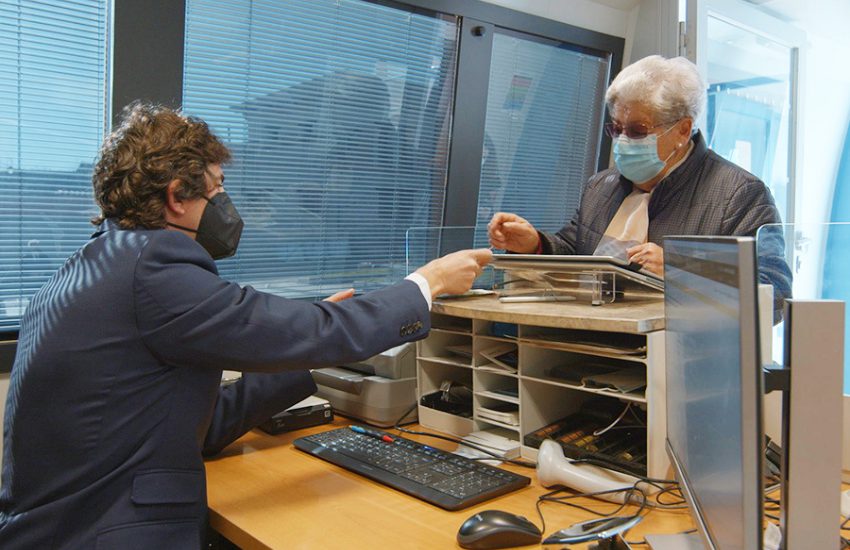This small Segovian municipality is one of the towns covered by the "ofibus", a mobile branch that serves the emptied Spain and includes all the services we use on a regular basis, from withdrawing or depositing cash to carrying out banking transactions, applying for a loan or signing policies.
Living in a small town means peace and quiet, being in contact with nature and personally knowing most of the locals, with whom you share very special ties despite the exodus of recent years. But it is also a harsh life with limited access to basic services. This is the reality that encompasses the "emptied Spain". A term that is associated with the inland territories of regions such as Castilla y León, Extremadura, Aragón and La Rioja. Charming places where there are many shortcomings, such as a restaurant or a greengrocer's shop. In fact, many of these businesses are crammed into vans and lorries, which the locals eagerly await to be able to buy the products they need, whether it is bread, fruit or meat. And, for some time now, their finances too.
In response to an existing need in these small municipalities, banks have set up a fleet of mobile branches to service local residents. They have made a remarkable effort to maintain their activities in these municipalities with the development of financial services designed and adapted even to the financial level of the inhabitants of the smallest towns, usually elderly people who do not even own a mobile phone.
Thanks to these mobile offices, banking has reached (on wheels) the inland towns located throughout the country. The initiative, promoted by CECA, the association created by savings banks and banks, makes it possible to maintain a branch in these places that includes all the necessary services for customers, from withdrawing or depositing cash, to carrying out banking transactions, applying for a loan or signing policies. An endless number of opportunities that are available to all residents and that allow them to lead a more comfortable life. An example of this can be found in Nieva, a livestock farming municipality in the countryside of Segovia (Castilla y León) which is home to only 265 residents, according to the latest data from the National Statistics Institute. A small census, like so many others in Spain, which requires money to buy the items needed by its residents.
Every time one of these mobile offices makes a stop in the town it is a day of celebration for the local residents. In the middle of a sea of pine trees, one of these ofibuses visits twice a month. Citizens can then manage their finances, but it is a true reflection of a situation that Spain has been experiencing for a long time now. "Depopulation is a demographic phenomenon, particularly intense in our country, which ultimately leads to the disappearance of basic services as a result of an unstoppable exodus of customers. Banks are affected by this situation but, even so, the sector's commitment is to continue serving the isolated populations of the emptied Spain by developing alternative service channels, such as mobile branches or the specific network of financial agents for rural areas, but also by entering into agreements with non-banking agents so that they can dispense cash", says Alberto Aza, CECA spokesperson.
Digitalisation has created a need for the users in these towns
The digital transformation of society is an unquestionable reality that has brought enormous benefits to society, but at the same time has led to a huge generation gap. It mainly affects the elderly. And many of them reside in these small towns, adding more problems to their equation. "The fact that you do not have a commercial branch in your municipality of residence does not equate to financial exclusion. With digitalisation you can operate with the bank", adds Alberto Aza, while acknowledging that most residents in these small towns do not even know how a smartphone works, which means that from these mobile offices they can even pay their bills and withdraw cash as they are used to doing.
María Luisa Gorgojo is, in addition to being the mayor of Nieva since 2007, a user of this type of banking services. "It is a very comfortable town where we have always had all the services, but now we are losing many things because the population has decreased in recent years", she adds. Until this year, she recalls, there was a school, however it had to close because it did not meet the student ratio required to remain open. In recent years, she has witnessed the closure of many services and businesses in her town due to a shortage of customers or the retirement of the owners. An unstoppable phenomenon.
But the same situation has also been repeated with bank branches. There are towns that do not have a physical branch. The residents of Nieva, for example, until recently had to travel to neighbouring towns such as Santa María la Real de Nieva or Navas de la Asunción, 3 and 10 kilometres away, respectively, in order to withdraw money. To do this, they had to come up with all kinds of solutions, such as asking for help from other neighbours, those that have their own transport. "In these towns there are many elderly people who don't drive or have retired and don't have a car", acknowledges the mayoress, who applauds the mobile office service. "It is a sensational project because it allows people to undertake any financial transaction, including updating their pension accounts. Older people are delighted because it's a way for them not to have to ask for help, allowing them to come on their own.
The service has the backing of financial institutions such as CaixaBank, Abanca, Kutxabank, Ibercaja Banco and Unicaja Banco. Together they serve some 456,590 customers residing in small municipalities. Pablo Gómez Ortega, director of the business area of Segovia Centro Sur at CaixaBank, believes that one of the most important strategies of this mobile branch service is to provide coverage in rural areas. "What we are trying to do is to reach as many municipalities as possible in order to have the highest possible penetration and meet our commitment to financial inclusion in all rural areas at a national level", he says.
Pablo Gómez Ortega recalls with emotion the first time he told the authorities of a municipality that the ofibus service was being launched. It was in Burgos, where it has a presence in 37 towns. "When the project came up, our main concern was not leaving behind any municipality that was not covered by a financial institution. We spoke to all the town councils where we were located and they were all very accommodating, they even helped us to find the best locations in town so that these would be fully accessible to all citizens", he adds.
A social event where residents come together
The arrival in town of the ofibus is a social event because many people gather around it at the same time and have a chat, talking about what has happened during the week and having the opportunity to catch up with each other. It is a very eagerly awaited day for the residents. "It's nice to go out and see them talk to each other and share what's been going on during the week. This way, at least, they have a good time. Here they sit on the benches in the square. It's more of a one-on-one situation", Gorgojo adds. "We have never -says Gómez Ortega- had any problems; to the contrary. The ofibus is a service that the town needs and we were determined to provide it. The experience was, and I got to witness it first-hand, wonderful". In his opinion, it is "another way of giving back to society this part of the financial business that is so important to us".
As a commercial agent on one of the ofibuses, the work of Carlos Plaza is essential, in that in the eyes of the customers in these depopulated areas, he is the visible face of the financial institutions. He is, without a doubt, the person who helps users and listens to them. And sometimes he almost acts as a psychologist, thus he acknowledges that he has a certain level of empathy. In his case, he travels to 44 towns in Castilla y León, full of personal stories that leave their mark. "It's mainly dealing with older people, 70 years old and above. It has to be personable, friendly and in a language they can understand", he says.
"The ofibus gives people a lot of freedom. Older people do not usually take the car. The services they have in the towns are very scarce and they need the money to be able to pay retailers, who often even arrive by lorry, like the greengrocers", he explains. "You can't talk to them the same way you talk to young people, who are more financially literate. You have to make it as simple as possible". Thanks to these mobile teams, we are undoubtedly providing a structure to areas where life flows peacefully.
Statistics
- The mobile branches of CECA's member entities travel 4.3 times the perimeter of the Earth per year
- They serve a population of 500,000 people
- Between them, they have 23 mobile teams nationwide
- They are present in 598 municipalities in Spain
- It has the most implantation in Castilla y León













